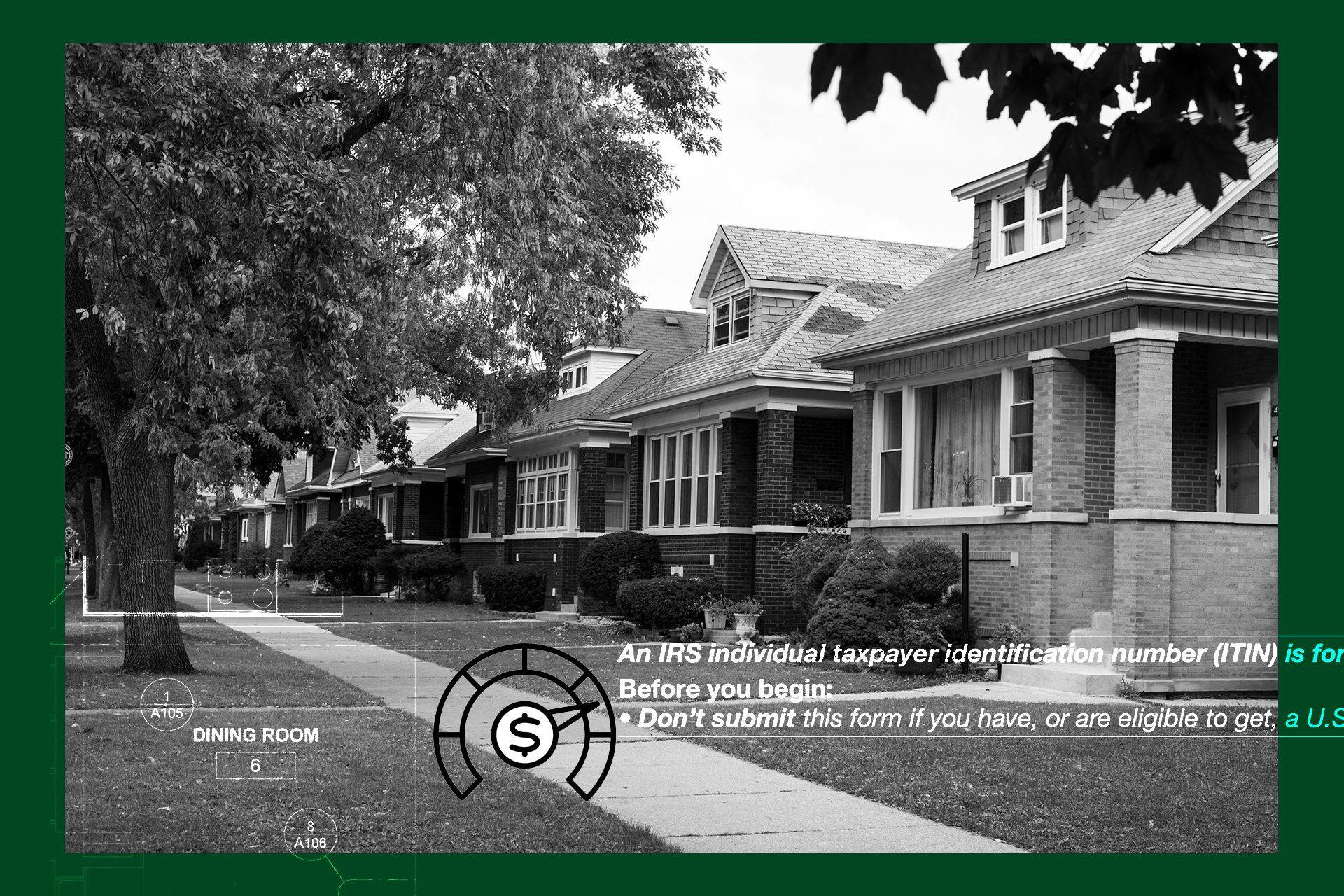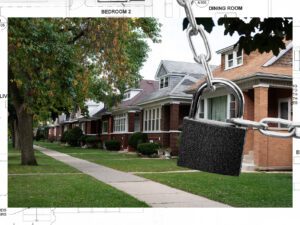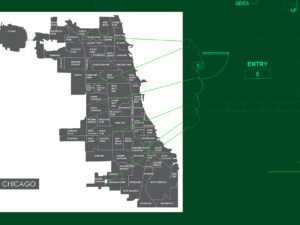 Photo illustration and photo by Max Herman/Borderless Magazine
Photo illustration and photo by Max Herman/Borderless Magazine Immigration status can complicate a person’s path to homeownership. Still, there are ways to prepare for home-buying, such as improving your credit and getting an ITIN number.
Homeownership is the cornerstone of the American dream. However, immigrants face unique barriers to buying a home.
Studies show that immigrant households experience higher costs of burdens and face lower homeownership rates. According to Harvard University’s Joint Center for Housing Studies, individuals who are undocumented or have a temporary visa often have less secure or well-paying jobs, which makes it difficult for them to afford a home or secure a trusted bank loan.
News that puts power under the spotlight and communities at the center.
Sign up for our free newsletter and get updates twice a week.
Immigrant households are also likely to be unbanked, making it harder for these individuals to prove their financial situation to lenders. Racial and language discrimination are also factors in securing a mortgage. For example, one 2014 study on subprime lenders in the early 2000s found that Hispanic borrowers living in areas with limited English fluency were found to have paid more for their mortgage if they used a white broker versus a Hispanic one.
Borderless created a guide to help people prepare to buy a home regardless of immigration status.
What do I need to get a loan from the bank?
Owning a home will likely be the most significant financial purchase a person will make in their lifetime. The most common way to purchase a home is by obtaining a bank loan, also known as a mortgage. Your FICO score, or credit score, often determines mortgage interest rates. In other words, the better you manage your financial lending to date, the lower the interest rates will be. That means you should pay your credit cards and student loans on time.
Although a higher credit score will help secure a lower interest rate, other factors can help individuals secure a bank loan. For example, bank statements showcasing savings accounts could prove to lenders that you are financially trustworthy.
“Lending institutions have their own criteria,” said Juliana Gonzalez-Crussi, executive director at the Center for Changing Lives. “Debt, income, credit, savings are all taken into account.”
What is an ITIN Number and how can I get one?
Homeownership for non-citizen individuals without a social security number can present some challenges since it is a niche market with few lenders offering products for noncitizens.
Individuals without a social security number can prove their financial information by using an ITIN, which stands for Individual Taxpayer Identification Number. An ITIN is used to file federal tax returns, which is another document banks consider when determining interest rates on loans.
To obtain an ITIN, individuals must:
- Fill out Form W-7, Application for IRS Individual Taxpayer Identification Number (ITIN), and submit it with your tax return.
- Contact an IRS-authorized Certifying Acceptance Agent.
- Make an appointment with the IRS Taxpayer Assistance Center.
More information can be found here.
Read More of Our Coverage
How is an ITIN loan different from a regular loan?
When applying for an ITIN loan, you will still need to provide proof of identification, income, and credit score.
ITIN loans are more expensive than traditional mortgages because there is no secondary market. According to the Urban Institute, the small number of lenders who do offer loans to ITIN holders do so at a much higher rate than traditional mortgage rates. The down payment required is also higher at 10-to-20 % compared to Federal Housing Administration mortgages that require 3.5%.
Where can I apply for an ITIN loan?
Credit unions and Community Development Financial Institutions (CDFI) tend to be the primary ITIN lenders in the market. Some independent mortgages and banks also offer ITIN loans, but the market is slimmer.
Who can I trust when it comes to starting the process of home ownership?
Talking about finances can be scary, especially with sensitivities around social security numbers and savings. Before going to a realtor or bank, the first place you should consult when buying a home is a HUD-approved housing counseling agency.
The HUD-approved housing counseling agency can instruct you on your rights and responsibilities. They will walk you through what you can afford, what credit score you might need, and how to get things sorted out in the first place.
Here is a list of HUD-approved housing counseling agencies in Chicago.
Read More of Our Coverage
What if I don’t have my money in a bank account?
Some individuals might not be putting their savings in the bank. According to Gonzalez-Crussi, “families that are immigrant families or undocumented families may not have that credit history or even established credit that may be unbanked.” A 2021 Federal Deposit Insurance Corporation estimates that 4.5 % of the U.S. population, roughly 5.9 million people, do not have bank accounts.
Homeownership could still be possible for these individuals. Showing proof of non-traditional forms of credit history, such as paying rent or phone bills, could help lending institutions determine loan rates. There are even financial tech applications, like eCredible, that help individuals who do not have credit report every utility payment. This is an alternative for individuals to establish a credit history.
Read More of Our Coverage
At the Center for Changing Lives, the organization uses the Lending Circle application, which is similar to a rotating payment system similar to a Mexican “Tanda” and a Nigerian “Esusu” or a Korean “kye.” Each month, a new member of the Lending Circle receives a loan until everyone in the group gets their chance.
“[The Lending Circle application] works to help people establish credit and prove credit because this app reports to the three credit bureaus. So while you’re making a payment in this circle, each payment is reported to the credit bureau,” Gonzalez-Crussi said.
This article was supported by a grant from The Chicago Community Trust.




